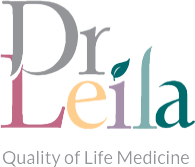Metabolic Medicine
Keep Your Competitive Edge on Life

Do you ever find yourself thinking, “I just don’t feel as good as I think I should. My life feels really hard. I try to be healthy but it feels like an uphill battle all of the time. I eat right, I exercise, but I feel tired and stressed. Why doesn’t my body work like it should?”
What’s the solution so you can finally feel normal again?
What Is Metabolic Medicine?
Metabolic and Functional Medicine, the fastest growing medical sub-specialty in the world, supports the body both nutritionally and hormonally. The providers at Dr. Leila, Quality of Life Medicine look at environmental toxins and lifestyle issues that can deplete a patient’s reserves and cause accelerated aging and disease. We focus on not only disease management but also the strength and vitality of patients.
According to recent medical research, inflammation causes most diseases, including fibromyalgia, diabetes, hypertension, asthma, rheumatoid arthritis, and cancer. Metabolic specialists work with their patients to understand the underlying cause of their increased inflammation, whether it be dietary allergens, environmental toxins, hormone imbalance, chronic infections, or an overgrowth of intestinal bacteria which leads to altered intestinal permeability.
The Effects of Stress
Stress, including toxins, makes our bodies function poorly. It affects us more than we’d like to admit. Even when we enjoy the life we have, our lives are much busier than what we were evolutionarily designed to do. Think of the caveman; he never tried to multitask – make stone tools, hunt a tiger, and start a fire all at once. He did one task at a time. A day in the 21st century, however, overflows with work, family, social media – you name it!
More → Learn How Adrenal Fatigue and Stress Affects Our Bodies
Daily stress comes from both psychological stress and toxin stress including heavy metals, pesticides, insecticides, plastics, and industrial agents. Toxins affect the body on both a cellular level and an organ level. They often interfere with the body’s ability to increase inflammation and make molecules of energy, called ATP. In relation to organs, they also act as endocrine disruptors, which decrease our endocrine organs’ ability to produce hormones. They also disrupt the adrenal production of cortisol, thyroid production of thyroid hormone, and testicular and ovarian production of sex hormones.
You can lead a full life and feel great at the same time when you support your body nutritionally and when you clear out toxins. Our bodies need extra help to compensate for the increased work from our overly-full lives.
Where Do We Get Energy?
If we want to feel good and function well, our cells need certain nutrients. A few basic nutrients, electrolytes and B vitamins, help our cells function better. Electrolytes – sodium, potassium, and chloride – drive every cellular process. Without adequate electrolytes in our cells, we can’t absorb nutrients, clear out waste, or make molecules of energy. When our electrolytes are low, we feel tired or nauseated, or we’ll get headaches. To replace electrolytes, Dr. Leila recommends alfalfa – a green that raises both sodium and potassium fairly equally – and sea salt.
The B vitamins are needed for every intra-cellular process, and especially for detox. We need B vitamins to break down and absorb food, clear out toxins, build healthy brain chemicals so we can feel good, and make white blood cells so our immune system can function properly. Dr. Leila recommends supplementing all of the B vitamins because most people are under more stress than their bodies were meant for. In addition, few people get enough vegetables in their diet to meet the body’s needs.
Fuel Your Body
In addition to the micronutrients our cells need, our body needs to be fueled with protein and a hormone called DHEA. We need protein to:
- Build muscle
- Produce healthy brain chemicals to help us feel good
- Keep our immune system functioning well
- Maintain high energy
Take at least one gram of protein per kilogram of body weight every day. For a 150 pound person, that’s about 70 grams of protein. Sometimes a patient’s intestines don’t efficiently absorb protein. Stress and toxins shut down the gut. To help this problem, take digestive enzymes with your meals as well as a good probiotic to help the gut absorb nutrients.
The hormone DHEA is our energy reserve tank. When our bodies don’t make enough DHEA, we feel tired and burned out. DHEA supplements help boost our energy, mood, thinking, muscle and joint aches, gut health, and immunity. Men can supplement with regular DHEA, but women need to be cautious. Women who are sensitive to regular DHEA should supplement with a form of DHEA called 7-keto DHEA. In women, regular DHEA can convert in the body to estrogen or testosterone and create further imbalance; however, 7-keto DHEA, a metabolite of DHEA, will stay as DHEA in the body.
Vitamin D & the Immune System
Everyone should take vital supplements such as Vitamin D and Omega-3 fatty acids (such as fish oil). Vitamin D reduces inflammation. Both Vitamin D and Omega-3 fatty acids help the immune system function better. Fatty acids support the nervous system, the heart, and healthy cholesterol levels. Probiotics help maintain a healthy bacterial balance in the gut.
Metabolic and functional medicine mitigates the effects of stress. In addition to supplements, take breaks during your busy day to relieve physical stress and emotional stress. During these breaks, take five deep breaths – in through the nose and out through the mouth – to release tension in your shoulders and body, or get up and walk. Exercising, of course, is an anti-ager! With a few simple nutrients, exercising, and taking a break, we can slow down the clock of aging and feel great!
Supplements For Metabolic Medicine
Alfalfa
When you have adrenal fatigue, you must replace electrolytes. Electrolytes drive every intracellular process we have – from absorbing nutrients, to clearing waste, to producing molecules of energy. Alfalfa is a “green” that raises sodium and potassium in an equal ratio.
Dosage: At least 430 mg twice daily
B Vitamins
B vitamins are essential for every cellular process we have. Dr. Leila recommends a B-100mg complex, which provides 100mg of most of the B vitamins. No B complex provides enough B12, so we need to take extra B12.
Dosage: About 2000 mcg per day
DHEA
DHEA is the hormone that “backs up” cortisol. It is our stress reserve tank. While we talk a lot about cortisol, DHEA is actually the bigger adrenal hormone. DHEA is used up in stress, and we make less DHEA as we age. We can replace DHEA by taking the over-the-counter supplement. Men can take regular DHEA, in doses of 50-10mg per day. Women, however, should either take a lower dose of regular DHEA, 25mg, or if they are sensitive, they should take a metabolite of DHEA called 7-keto DHEA. 7-keto DHEA will stay as DHEA in the body. It will not convert to other hormones like estrogen and testosterone like regular DHEA can.
Dosage: 25mg or regular DHEA or 100-200 mg of 7-keto DHEA per day for women will keep us feeling energetic and youthful.
Vitamin D
Vitamin D actually isn’t a vitamin, but a hormone that builds healthy bones and supports the healthy functioning of the immune system. When we are low in Vitamin D we have more inflammation and therefore can feel more aches. Because we make vitamin D when sunlight hits our skin, the dosing depends on where you live. If you live in the northeast, 4000-5000 IU/day of vitamin D is required. If you live in sunnier spots like California or Florida, you may only require 1000-2000 IU/day of vitamin D. The good thing is that we can check vitamin D levels in blood. Make sure your doctor checks the 25-hydroxycalciferol form of vitamin D. Optimal levels should be between 60-80 ng/mL.
Dosage: Northeast 4000-5000 IU/day: West Coast, South & Southwest 1000-2000 IU/day
Omega-3 Fatty Acids
Omega three fatty acids, or “fish oil”, has numerous health benefits. Omega-3 fatty acids reduce inflammation so they help with aching muscles and joints. They promote healthy blood pressure, cholesterol levels, and the health of our arteries, so they are an excellent supplement to help prevent heart disease. Omega-3’s are needed by the brain for healthy nerve formation. What great anti-agers!
Dosage: At least 1000 mg/day can help many areas of health.
Probiotics
We now know that we should have more bacterial DNA in us than our own DNA! Without healthy bacteria, the body cannot function properly. Healthy bacteria help take in nutrients and clean out toxins. They actually make some of our nutrients for us, and even make neurotransmitters so that we can feel good. With the widespread use of pesticides and increased stress, we often don’t have enough healthy bacteria in our gut. A good way to counter this is to take a probiotic every day. Probiotics should contain both lactobacillus and bifidobacterium species.
Dosage: At least 15 billion CFU per day.





